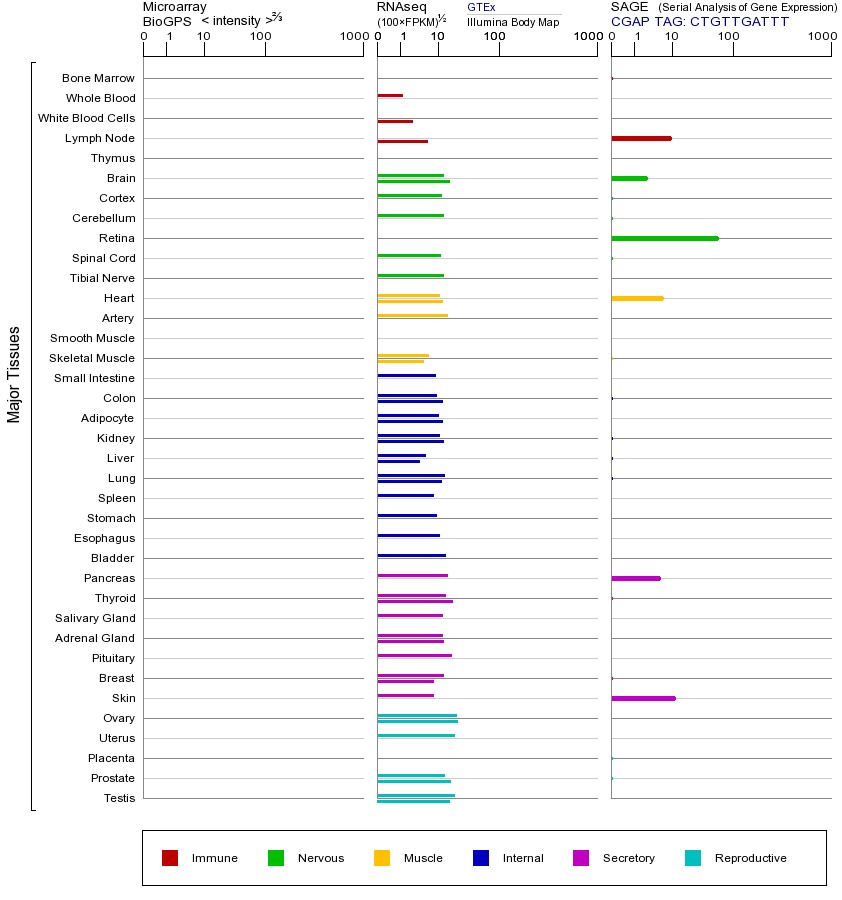PCDHB5 (protocadherin beta 5)
- symbol:
- PCDHB5
- locus group:
- other
- location:
- 5q31.3
- gene_family:
- Clustered protocadherins
- alias symbol:
- DKFZp586B0217|PCDH-BETA5
- alias name:
- None
- entrez id:
- 26167
- ensembl gene id:
- ENSG00000113209
- ucsc gene id:
- uc003liq.5
- refseq accession:
- NM_015669
- hgnc_id:
- HGNC:8690
- approved reserved:
- 2000-06-28
PCDHB5(Protocadherin Beta 5)属于原钙粘蛋白β(PCDHB)基因家族,该家族是钙粘蛋白超家族的一部分,主要参与细胞间粘附和信号传导。PCDHB家族成员在神经系统中高度表达,尤其在神经元中,对神经回路的形成、突触可塑性和神经元多样性起关键作用。PCDHB5编码的蛋白质是一种跨膜蛋白,通过钙离子依赖的机制介导细胞间相互作用,影响神经元的识别、迁移和连接。该基因的突变可能导致神经发育异常,与自闭症谱系障碍(ASD)和精神分裂症等神经精神疾病有关。研究表明,PCDHB5表达异常可能破坏神经元网络,导致认知和行为障碍。过表达PCDHB5可能增强神经元粘附,但过度连接可能干扰神经信号传导;而表达降低可能导致突触功能缺陷或神经元错误导向。PCDHB基因家族的共性包括含有多个细胞外钙粘蛋白重复序列、一个跨膜结构域和一个保守的胞内结构域,通过同源或异源相互作用调控神经发育。此外,PCDHB5可能与其他PCDH家族成员协同作用,共同维持神经系统的精细调控。研究还发现,某些癌症中PCDHB5表达异常,可能与肿瘤侵袭和转移相关,但其具体机制仍需进一步探索。总体而言,PCDHB5在神经发育和疾病中扮演重要角色,其功能异常可能对大脑健康和疾病发生发展产生深远影响。
This gene is a member of the protocadherin beta gene cluster, one of three related gene clusters tandemly linked on chromosome five. The gene clusters demonstrate an unusual genomic organization similar to that of B-cell and T-cell receptor gene clusters. The beta cluster contains 16 genes and 3 pseudogenes, each encoding 6 extracellular cadherin domains and a cytoplasmic tail that deviates from others in the cadherin superfamily. The extracellular domains interact in a homophilic manner to specify differential cell-cell connections. Unlike the alpha and gamma clusters, the transcripts from these genes are made up of only one large exon, not sharing common 3' exons as expected. These neural cadherin-like cell adhesion proteins are integral plasma membrane proteins. Their specific functions are unknown but they most likely play a critical role in the establishment and function of specific cell-cell neural connections. [provided by RefSeq, Jul 2008]
此基因是protocadherinβ基因簇的一个成员,的五个染色体串联连接三个相关的基因簇之一。该基因簇表明类似于B细胞和T细胞受体基因簇的一个不寻常的基因组组织。公测簇包含16个基因和3个假,每个编码6外钙粘蛋白结构域和其他人偏离了钙粘蛋白超家族胞质尾。胞外结构域在一个嗜同的方式进行交互以指定差动细胞 - 细胞连接。不同的是α和γ集群,从这些基因的成绩单是由只有一个大外显子,不按预期分享共同3‘外显子。这些神经钙粘蛋白样细胞粘附蛋白是一体的质膜蛋白。其具体的功能是未知的,但它们最有可能发挥特定细胞 - 细胞的神经连接的建立和功能起关键作用。 [由RefSeq的,2008年7月提供]
基因本体信息
PCDHB5基因(以及对应的蛋白质)的细胞分布位置:
- 质膜
- 细胞质
- 细胞外
- 高尔基体
- 囊泡
- 细胞骨架
- 内质网
- 细胞核
- 内体
- 溶酶体
- 线粒体
PCDHB5基因的本体(GO)信息:
联系方式
山东省济南市章丘区文博路2号 齐鲁师范学院 genelibs生信实验室
山东省济南市高新区舜华路750号大学科技园北区F座4单元2楼
电话: 0531-88819269
E-mail: product@genelibs.com
微信公众号
关注微信订阅号,实时查看信息,关注医学生物学动态。







